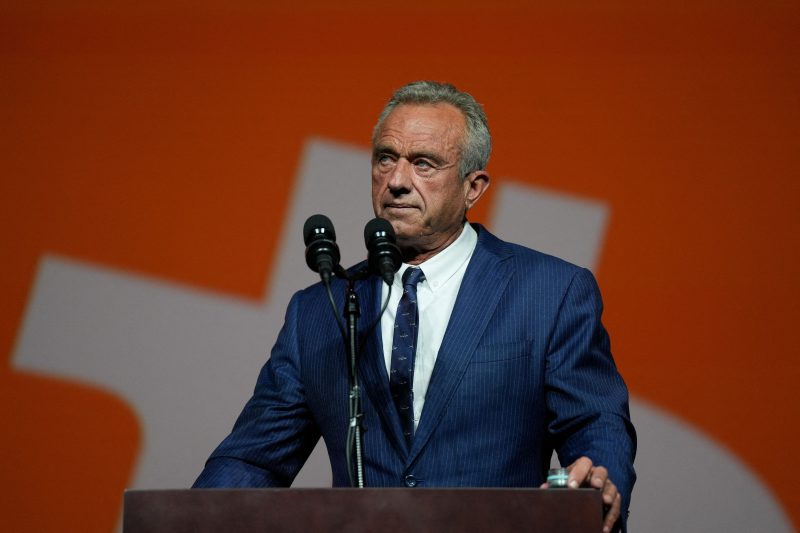
RFK Jr. fought to get on N.C. ballots. Now he’s suing to get off them.
Robert F. Kennedy Jr., the third-party presidential candidate who suspended his campaign and endorsed Republican nominee Donald Trump, is suing the North Carolina State Board of Elections to get his name taken off the state’s November ballot.
Kennedy, who fought legal battles to remain on the North Carolina ballot, said last month that he would remove his name from battleground state ballots so as not to swing the election in Vice President Kamala Harris’s favor. But last week, the North Carolina State Board of Elections rejected Kennedy’s request to be taken off the ballot, saying it would “not be practical” to reprint ballots in time for the start of absentee voting on Sept. 6.
Kennedy’s lawsuit, filed Friday in Wake County Superior Court, alleged that the elections board was violating North Carolina law in denying his request. He accused the board of applying a “subjective ‘practicality’ standard” in the decision and added that he had followed the proper protocols in his request to remove his name. Kennedy requested an immediate judgment in the case, citing the November election date and upcoming ballot deadlines.
Kennedy’s attorneys did not immediately respond to a request for comment Sunday evening. A spokesperson for the North Carolina State Board of Elections directed The Washington Post to the state attorney general’s office, which said it was reviewing the complaint.
On Aug. 23, Kennedy said despite suspending his campaign, he would keep his name on ballots in solidly red and blue states, but would remove it in critical states.
“Our polling consistently showed that by staying on the ballot in the battleground states, I would likely hand the election over to the Democrats, with whom I disagree on the most existential issues — censorship, war and chronic disease,” he said.
On the campaign trail this year, Kennedy — the nephew of former president John F. Kennedy and the son of former attorney general Robert F. Kennedy — positioned himself to voters as a viable third-party option opposed to both Trump and President Joe Biden.
During his remarks to suspend his campaign, just over one month after Biden’s exit and endorsement of Harris, Kennedy urged supporters to vote for him in states where he planned to keep himself on the ballot. He added that he had already started the process of removing his name from the ballots of 10 battleground states, where he did not want to swing the election toward Harris. Polling has shown that a majority of Kennedy’s independent supporters lean Republican.
But Kennedy still remains on three battleground ballots: Michigan, Wisconsin and North Carolina. In Michigan and Wisconsin, a nominated and qualified candidate cannot be removed from the ballot unless they die.
In North Carolina, Kennedy landed on the ballot in mid-July after the state elections board officially recognized the “We The People” party, which he created for greater ballot access. The North Carolina Democratic Party then sued to block Kennedy’s name on the general election ballot, accusing him of using the We The People party as a vehicle to avoid the ballot requirements for independent candidates. Ultimately, a judge ruled in Kennedy’s favor.
That ruling was a victory for Kennedy until he suspended his campaign and began submitting requests to withdraw his name.
Arizona, which will begin mailing its absentee ballots to voters on Sept. 21, granted Kennedy’s request and Florida, which had an Aug. 24 deadline for minor parties to submit their nominees, granted Kennedy’s requests. Nevada and Pennsylvania, where Kennedy faced legal battles against his candidacy, also took him off the general election ballot.
But on Thursday, the North Carolina elections board denied his request in a 3-2 vote along party lines.
The board said in a news release following the vote that 1,730,000 ballots had already been printed with Kennedy’s name. The board plans to send those ballots to voters, including residents in the military and living overseas, starting Sept. 6. Printing new ballots would “leave most North Carolina counties without ballots until mid-September at the earliest and lead to significant additional costs,” the board said.
North Carolina state law does not stipulate a deadline for presidential nominees to request removal from the ballot, the board said in its release. But a separate state provision allows the elections board to “determine whether it is practical to reprint ballots” after removal requests are received, according to the release.
Meryl Kornfield contributed to this report.
